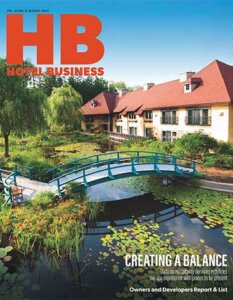Hotel rooms can be used in a lot of ways—from a place to live when traveling for business or leisure, to an impromptu office or meeting place, to a workout room, a place to hang out or even a playroom for children.
Now, an entrepreneur based in Romania is introducing a way to make it easier for hoteliers and guests to transform their rooms for all of those purposes—at the press of a button.
“With the revolution in technology in the last 15 years, nearly everything around us has been changed dramatically,” said Cornel Marin, founder/owner, Triple Seven Capital, who came up with the Multifunctional Hotel Rooms concept. “One area that has not really seen that revolution is the interior space, whether it be apartments, condos or hotel rooms. I’m not talking about changing the decor because that has always been updated. I am talking about the functionality of spaces.”

The Multifunctional Hotel Rooms concept from Triple Seven Capital with Room Innovation allows rooms to transform for a variety of guest needs.
He pointed out that walls, doors and ceilings are pretty much the same as they were 100 years ago, but the younger generations want technology to be part of everything they do.
“They want multifunctionality for everything,” he said. “They like to have their phones in their hands and press a button and have information and items at their fingertips.”
Marin’s concept would focus on freeing up space within a room by reconfiguring what are typically fixed elements. Working with products from a company called Room Innovation, the beds and walls in a room would rise to the ceiling, creating more space.
Underneath the elevated bed might be a desk, which would allow guests to work without being crowded into a corner or stuck with a small work surface. “The bed would rise and, automatically, it has an office desk under the bed,” said Marin. “When the bed has reached the ceiling, the desk is at the regular height for a working desk. When the bed goes up, the office desk automatically rises to its regular position.”
Marin said that gym machinery, such as a folding treadmill, might also be under the bed.
“The bed disappears and the whole room is more or less empty,” he said. “Instead, you automatically have your private gym or a living room. The bed can also sit on couches.”
With the bed out of the way, it is like having a suite within the footprint of a regular room. “You use the very same room, no matter how small or large it is,” he said. “You have very different functionalities for the same room. Every change just takes 30 seconds. You just press a button.”
In addition to the bed rising to the ceiling, the system will also allow for certain walls to rise and lower at the touch of a button, folding into a space in the ceiling that looks like a crossbeam.
“Some people might want the kitchen in the room to open to make the room more airy,” said Marin. “Others might prefer to have the kitchen separated because of the odors that come from cooking or they just might not want to see it.”
To help offset the costs for upgrading their rooms, the entrepreneur has added a module to the concept, which he has copyrighted called “Pay per Use,” which applies an optional fee to be paid by guests only if they use the multifunctionality of the room. The fee will be shared between the hotelier and Marin’s company.
“It is a revenue method that has never been used in the industry before,” he said. “Guests would probably be more than happy to pay an extra fee to change the functionality of the room. For hoteliers, it is like buying a new Tesla, which pays for itself entirely, and after it is paid off will still generate extra revenue for its owner.”
While the concept has not been implemented in any hotels yet, Marin, who is looking for investors, has been in contact with several major hotel companies who have expressed interest.
He believes that his concept can change the hotel industry. “This is something completely different from anything the industry has seen before,” he said. “I think it will revolutionize hotels worldwide. In the near future, the accommodations industry will be separated in two categories: hotels that have multifunctional rooms and those that don’t.”


